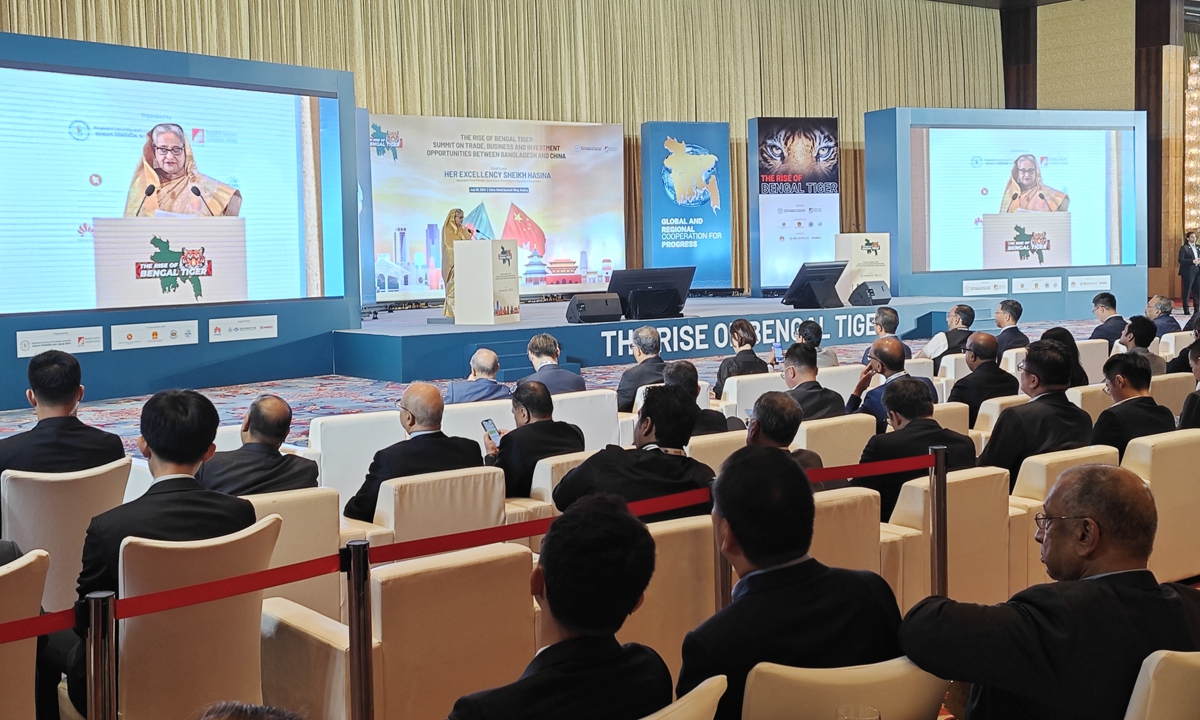Businesses ramp up for new opportunities as China, Bangladesh usher in new era of trade and investment cooperation

Prime Minister of Bangladesh Sheikh Hasina gives a speech at the Summit on Trade, Business, and Investment Opportunities between Bangladesh and China in Beijing on July 9, 2024. Photo: Yin Yeping/GT
Government officials and business representatives from both China and Bangladesh are optimistic about bilateral economic and trade ties as they become stronger than ever, as highlighted at a high-level investment summit held in Beijing on Tuesday, during which over a dozen of agreements across industries were signed between businesses from both sides.
This comes amid the ongoing three-day visit of the Prime Minister of Bangladesh Sheikh Hasina to China starting on Monday, the first since her new term began.
The Summit on Trade, Business, and Investment Opportunities between Bangladesh and China in Beijing on Tuesday saw over 1,000 representatives from governments and the business sector on both sides. The event was praised for fostering closer ties between the two countries, with participants expressing their readiness to usher in a new era of bilateral trade and investment cooperation.
During the summit, 16 memorandums of understanding were signed between Chinese and Bangladeshi companies. These agreements span various critical sectors for Bangladesh's development, including telecommunications, infrastructure, electric vehicles, solar power and nuclear power, among others.
Speaking at Tuesday's summit, the Bangladeshi prime minister stated the significance of the contribution that Chinese investors have made to the country while expressing her welcome to more Chinese companies to come and invest there.
"Bangladesh and China have a long tradition of bilateral cooperation and mutual support. China has been significantly contributing to our infrastructure projects, technological advancements and overall growth of our economy," Hasina said, noting that "It's time for us to explore new areas for the collaboration, trade and investment."
The prime minister said that Bangladesh welcomes Chinese investments in the country's export-oriented industries, "which will help us diversify our export basket and reduce trade deficits."
"To enhance business cooperation, we encourage the Chinese companies to form joint ventures with Bangladeshi firms," she said.
Responding to the many cooperative agreements signed today, Rashadul Hossain Chowdhury Ronni, vice-president of the Federation of Bangladesh Chambers of Commerce & Industry, told the Global Times on Tuesday that "this is just a beginning of our greater bilateral collaboration as both nations are embracing more opportunities for cooperation in the future."
"We are all here looking for more opportunities in the bilateral joint collaboration. Currently, we have a lot of Chinese businesspeople in Bangladesh right now, and now the era for more cooperation is coming," Ronni said.
There are several areas where he sees huge opportunities for cooperation between the two sides. These include machinery, agriculture, road and bridge construction and hospitality industry, Ronni said, noting that China's cooperation can help facilitate Bangladesh's Vision 2041, which aims for the country to become a developed nation.
Ronni's optimism for a greater opportunity for cooperation between the two countries epitomizes the common views shared by businesses elites in the two countries.
Ahsan Khan Chowdhury, chairman and CEO of PRAN-RFL Group, the largest food and plastics company in the country, told the Global Times on Tuesday that closer ties with China mean a lot to his businesses.
Chowdhury has been working in China for the last 30 years, mainly purchasing Chinese equipment and selling it in Bangladesh, and he is grateful to Chinese partners for giving him very reasonable prices for the equipment, which has helped him run a very successful business.
"Today, we are the largest food company in Bangladesh. We are the largest plastics company in Bangladesh. And most of my factories are built with Chinese machines," he said, noting that he constantly depends on China to run an efficient business in Bangladesh, where China is a very important part of his supply chain.
"I hope that more cooperation will take place under the Belt and Road Initiative, so that bilateral trade will get stronger," the Bangladeshi businessman said.
Looking ahead, Chowdhury wants to start more businesses with the Chinese companies that are planning to start operating in Bangladesh for export to different parts of the world, because Bangladesh has a very low-cost manufacturing capability, Chowdhury said.
Economic and trade cooperation has always been a cornerstone of China-Bangladesh bilateral relations. Over the years, nearly 7,000 Chinese enterprises have flourished in the South Asian country, contributing to a wide range of sectors including trade, investment, as well as some landmark projects, Chinese Ambassador to Bangladesh Yao Wen said at the summit.
The ambassador said that this partnership has propelled China to become Bangladesh's largest trading partner and second-largest source of foreign investment, as well as providing over 550,000 job opportunities, greatly improving the welfare of the Bangladeshi people.
One latest achievement in bilateral cooperation is the launching of direct flights connecting the two countries' capitals. According to arrangements by aviation authorities in China and Bangladesh, Air China will inaugurate a direct flight from Beijing to Dhaka on Wednesday, with plans to operate four flights weekly. Meanwhile, China Southern Airlines will launch a direct flight from Beijing to Dhaka on July 15, with two flights per week.
"These direct flights will facilitate enhanced business interactions between the two nations," Yao said.
Hasina's visit holds historical significance for Chinese-Bangladeshi relations, bridging past achievements with future prospects, and aiming to elevate bilateral ties to new heights, Yao noted.
The ambassador called upon enterprises from both China and Bangladesh to seize the opportunity to deepen practical cooperation, strive for more commercial contracts, and usher in a new era of trade and investment cooperation.



